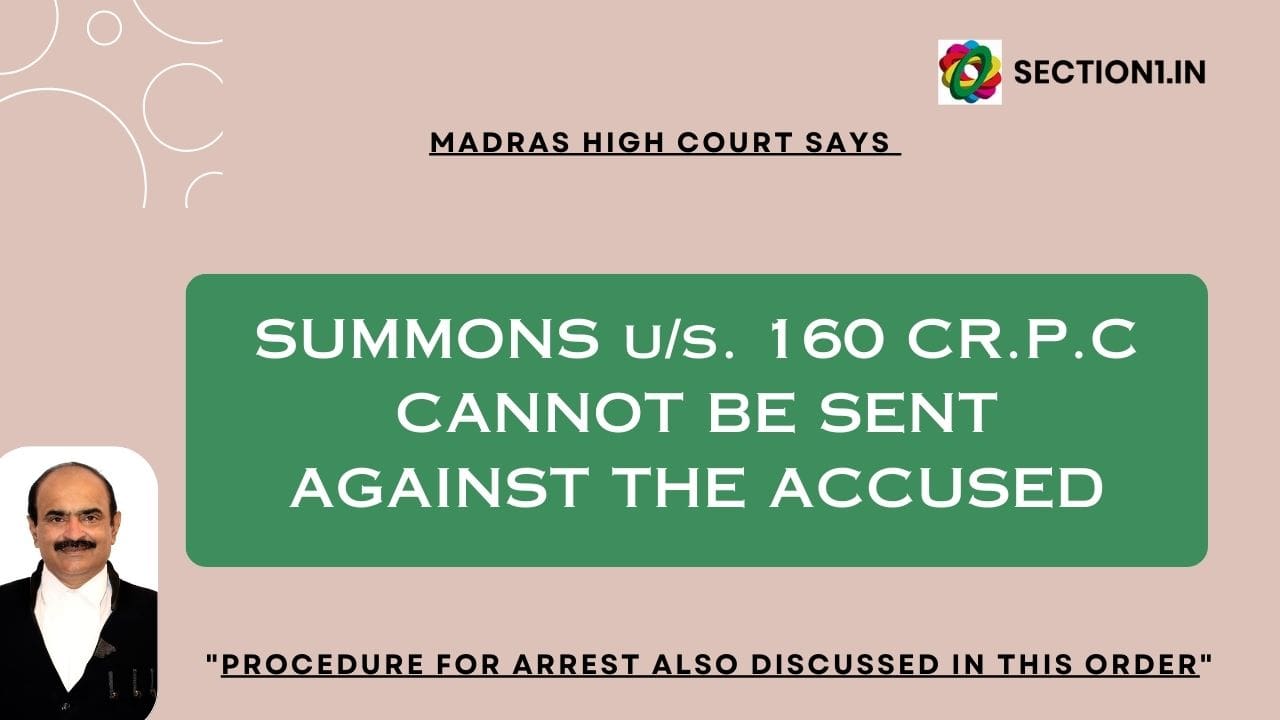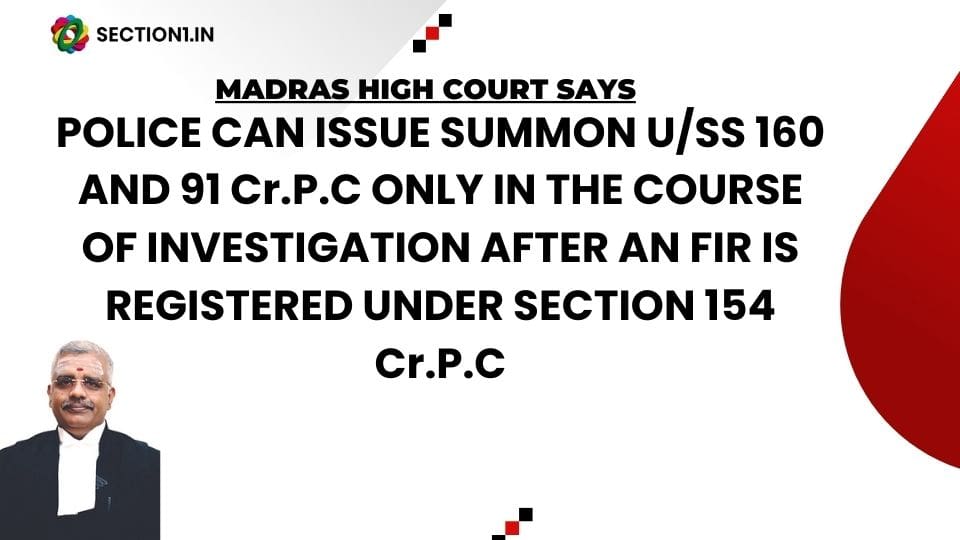This petition has been filed to quash the unnumbered summons dated 02.06.2022 in CSR No.821 of 2022 on the file of the Respondent Police.
3. Learned counsel for the Petitioners mainly submitted that without registering the FIR under Section 154 Cr.P.C., the police have issued summons under Section 160 of Cr.P.C., calling upon the Petitioners who are resident of Bangalore. Hence, it is his contention that issuance of summons outside the jurisdiction of the Respondent Police is not valid in the eye of law. Only after registering the FIR, summons should be issued. Therefore, submitted that issuance of summons under Section 160 Cr.P.C. before commencing investigation is contrary to law.
4. In support of his submissions he also placed reliance on the judgment of this Court in V.N. Pachaimuthu vs. The Superintendent of Police, Villupuram [2012(3) CTC 291] and the order passed by this Court in Benjamin vs. The Superintendent of Police [Crl.O.P.(MD)No.9821 of 2017 dated 05.09.2019] and Preetham vs. Deputy Superintendent of Police and another [ Crl.O.P.No.15000 of 2021 dated 31.08.2021].
xxxx
7. The impugned notice when carefully seen, there is no reference under 160 Cr.P.C. and just a notice has been issued calling upon the petitioner to come with documents for enquiry. The police has not referred the provision of Section 160 Cr.P.C.in that notice.
8. Be that as it may. Section 160 Cr.P.C. deals with police officer’s power to require attendance of witnesses. Any police officer making an investigation under this Chapter may, by order in writing, require the attendance before himself of any person within the limits of his own or any adjoining station who, from the information given or otherwise, appears to be acquainted with the facts and circumstances of the case; and such person shall attend as so required: Provided that (1) no male person under the age of fifteen years or woman shall be required to attend at any place other than the place in which such male person or woman resides; 2) The State Government may, by rules made in this behalf, provide for the payment by the police officer of the reasonable expenses of every person, attending under sub-section (1) at any place other than his residence.
9. On a careful perusal of the above provision, for issuance of summons the same can be issued for attendance of witness who resides within the limit of the police station jurisdiction or any adjoining station. Further on a perusal of the Section makes it very clear that the issuance of the summons under Section 160 Cr.P.C. applies only to the cases of persons who appears to be acquainted with the facts and circumstances of the case, who are only witness or possible witnesses. Once the FIR has been registered as against the accused, summons cannot be issued against the accused under Section 160 Cr.P.C. for requiring his attendance for an accused person with a view to answering the charge made against him, as held by the Apex Court in State vs NMT Joy Immaculate reported in AIR 2004 SC 2282. This Court also in V.N. Pachaimuthu’s case (supra) has held that Notice under Section 160 Cr.P.C. can be issued only to witness in any pending FIR but not to a person who is an accused. Therefore, for invoking the provision under section 160 Cr.P.C. for summoning the accused is not permissible to answer the charge. Further, even against any witnesses, the summons could be issued only within the jurisdiction of the police station or any adjoining police station. Beyond that such summons is not permissible as per the Section 160 Cr.P.C. Whereas in the case on hand, the police has not made any reference as to whether the summons issued is under Section 160 Cr.P.C. Whereas it is only a notice without reference to the provision of law. In a Crl.O.P this Court is accepting the view of the V.N. Pachaimuthu’s case (supra) and quashed the summons with a liberty to the police to proceed further with the case and deal with the complaint in accordance with the guidelines given by the Honourable Apex Court in Lalitha Kumari Vs. Government of Uttar Pradesh [2013 (6) CTC 353].
10. The contention of the learned counsel for the Petitioner is that once the complaint is filed when the offence is made out the police has to proceed to register the FIR as per the dictum laid down in Lalitha kumari’s case (supra). The Honourable Apex Court in Lalitha kumari’s case (supra) has held that if the information given to the police discloses the commission of cognizable offence, there is no other option but to register an FIR forthwith. The other considerations are not relevant at the stage of registration of the FIR, such as, whether the information is falsely given, whether the information is genuine, whether the information is credible etc., These are the issues that have to be verified during the investigation. At the stage of registration of FIR, what is to be seen is merely whether the information given ex facie discloses the commission of a cognizable offence. In the same judgment the Honourable Apex Court has also held that if the information received does not disclose a cognizable offence but indicates the necessity for an inquiry, a preliminary inquiry may be conducted only to ascertain whether cognizable offence is disclosed or not. The Preliminary enquiry is only to ascertain whether the information reveals any cognizable offence. The Honourable Supreme Court in the above case has also held that as to what type and which case wherein preliminary enquiry will depend on the facts and circumstances of each case. One such a category is commercial offences also. The Honourable Apex Court further held that in matrimony disputes, Medical negligence cases, corruption cases also preliminary enquiry can be conducted.
11. Here, the complaint given before the Police is relating to the dispute arising out of employment. Therefore, any cognizable offence is made out or not, it is the duty of the police to make an enquiry to ascertain any cognizable offence is made out. In such a view of the matter, it cannot be said that police has no power to call for any enquiry of any person.
….
12. On perusal of the above provisions makes it clear that when a reasonable complaint has been made or credible information has been received or a reasonable suspicion exists that a person has committed a cognizable offence, a Notice shall be issued to that person to appear before him or at any such other place as may be specified in the notice. Therefore, when a reasonable complaint has been made and a reasonable suspicion exists, it cannot be said that police has no power to call a person against whom the complaint is made, to conduct preliminary enquiry and to ascertain whether any cognizable offence is made out or not. Therefore, the contention of the learned counsel for the Petitioner that no such notice is permissible, cannot be countenanced.
13. The distinction between Section 160 and 41-A Cr.P.C.is that summons under Section 160 Cr.P.C. could be issued only to the witnesses within the jurisdiction of the police station or adjoining police station. Summons cannot be extended to beyond the jurisdiction. Whereas Section 41-A Cr.P.C. does not restrict the police to issue a notice to any person. The restriction of the jurisdiction also taken away. Therefore, the police can very well issue notice under Section 41- A Cr.P.C. when there is reasonable complaint made or any suspicion exists that he has committed any cognizable offence. In such a view of the matter the police is always have a power to issue notice under Section 41-A Cr.P.C. to ascertain as to whether any cognizable offence is made out or not.
14. As far as the impugned notice is concerned, whether it is summons under Section 160 Cr.P.C. or Notice under Section 41-A Cr.P.C. has not been indicated. Hence, the same is liable to be quashed giving liberty to police to issue notice under Section 41-A Cr.P.C and to conduct preliminary enquiry as per the guidelines set out in the judgment of the Apex Court in Lalitha kumari’s Case (Supra).
PARTY: V.T. Lazar vs. The Inspector of Police, Poonamallee Police Station, Chennai 600056 – Crl.O.P. No. 14796 of 2022 and Crl.M.P. No. 8201 of 2022 – dt: 13.07.2022.
https://www.mhc.tn.gov.in/judis/index.php/casestatus/viewpdf/672488
v.t.lazar vs. The inspector of police – 160 summons cannot be invoked against accused.




